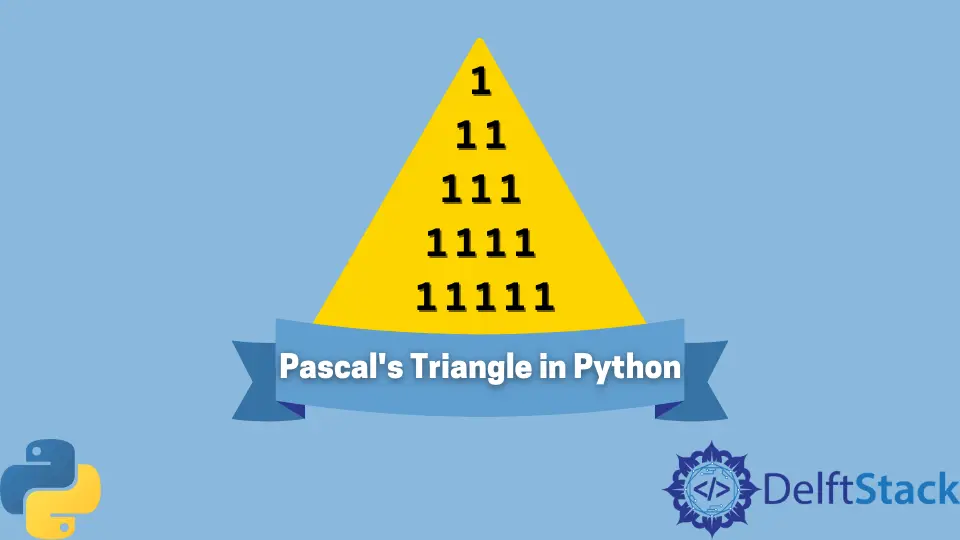用 Python 制作帕斯卡三角形
Lakshay Kapoor
2023年1月30日

帕斯卡三角形被定义为一种数字模式,其中数字排列成三角形。在这个数学概念中形成了一个三角形阵列,由相邻行之和的数字组成。此外,外部边缘始终为 1。
Python 中的帕斯卡三角算法
要在 Python 中形成帕斯卡三角形,在软件中是有步骤的。
- 首先,从用户处获取输入数字以定义行数。
- 其次,定义一个空列表,用于存储值。
- 然后,使用
for循环从0到n-1迭代,将子列表附加到初始列表。 - 之后,
1被附加到列表中。 - 然后,再次使用
for循环将数字的值放入三角形的相邻行内。 - 最后,根据给定的格式打印帕斯卡三角形。
用 Python 编写帕斯卡三角形的程序
input_num = int(input("Enter the number of rows: "))
list = [] # an empty list
for n in range(input_num):
list.append([])
list[n].append(1)
for m in range(1, n):
list[n].append(list[n - 1][m - 1] + list[n - 1][m])
if input_num != 0:
list[n].append(1)
for n in range(input_num):
print(" " * (input_num - n), end=" ", sep=" ")
for m in range(0, n + 1):
print("{0:5}".format(list[n][m]), end=" ", sep=" ")
print()
输出:
Enter the number: 5
1
1 1
1 2 1
1 3 3 1
1 4 6 4 1
在 Python 中使用二项式系数打印帕斯卡三角形
在这种方法中,三角形中的每一行只包含 1,并且一行中第 n 个数等于二项式系数。看下面的示例程序。
num = int(input("Enter the number of rows:"))
for n in range(1, num + 1):
for m in range(0, num - n + 1):
print(" ", end="")
# first element is always 1
B = 1
for m in range(1, n + 1):
# first value in a line is always 1
print(" ", B, sep="", end="")
# using Binomial Coefficient
BC = B * (n - m) // m
print()
输出:
Enter the number of rows:5
1
1 1
1 1 1
1 1 1 1
1 1 1 1 1
在此方法中,用于二项式系数的公式为:
BC = B(line(m), n-1) * (line(m) - n + 1) / n
在 Python 中通过计算 11 的幂来打印帕斯卡的三角形
这种方法完全基于数字 11 的幂,因为数字 11 的幂的递增值形成了帕斯卡三角形图案。
从数学上讲,事情是这样的。
11 * 0 = 1
11 * 1 = 11
11 * 2 = 121
11 * 3 = 1331
11 * 4 = 14641
现在在 Python 中应用此技术,请参阅下面的代码块。
num = int(input("Enter the number of rows:"))
for n in range(num):
print(" " * (num - n), end="")
print(" ".join(map(str, str(11 ** n))))
输出:
Enter the number of rows:5
1
1 1
1 2 1
1 3 3 1
1 4 6 4 1
作者: Lakshay Kapoor
Lakshay Kapoor is a final year B.Tech Computer Science student at Amity University Noida. He is familiar with programming languages and their real-world applications (Python/R/C++). Deeply interested in the area of Data Sciences and Machine Learning.
LinkedIn